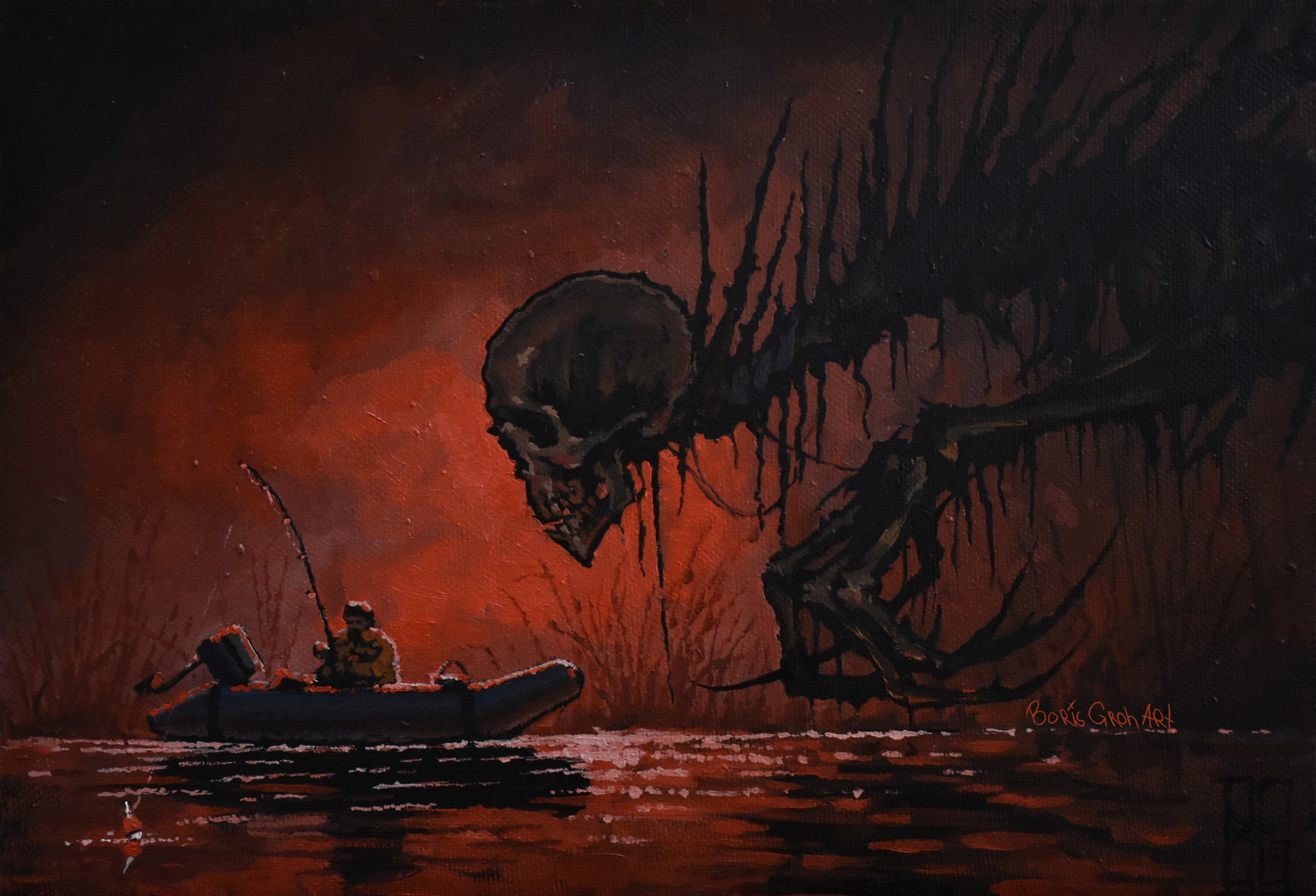O V E R L O A D
Y O U R
E N C O U N T E R
D I C E
 |
| Unexpected visitors at the most inconvenient times, credit Boris Groh |
I've combined ideas from a number of sources here, and so far? They are working damn well together. Brendan for the original design goal, Beloch for Recurring Characters, Chris M for the encounter table structure, Chris W for the Faction Mechanic, Dungeon Robber for Glints. Most of this probably isn't new to you, but keep an eye out, I've been
Dungeon Delving
Every three rooms, or when the PCs spend time putzing around doing things, roll 1d6:
- Encounter
- Glint
- Terrain Effect
- Hazard/Trap
- Torch decreases (1/2)
- Torch and lantern (1/3) decreases
If you roll an encounter, the general format for each zone is:
- Recurring Characters
- Primary Faction in area
- Primary Faction in area, but Worse (more powerful, knowledgable about you etc.)
- Secondary Faction in area, or from a nearby area
- Solitary entity/oddity
- Boss
If you roll a Glint then Something Will Happen if the PCs continue on the same path. If you rolled a Glint during a rest or while not moving for some other reason, then Something Happens if they don't travel elsewhere:
- Encounter surprises Party
- Party surprises Encounter
- Just something reflected/echoes down here etc.
- Just your mind playing tricks on you...
- Trap!
- Loot!
If you leave someone behind in the dungeon, whether a wandering ally, neutral party, fleeing/pursuing enemies, add them to the list of Recurring Characters. Keep in note that Wandering Monsters should really be called Mobile Enemy Forces. If an enemy would be found in a particular room, then it's stuck there for some reason - maybe it only lives in that area, it's asleep, it's guarding a very particular location etc. If it's not stuck, then it's hardly Wandering: whether scouting, hunting or patrolling, a Mobile Encounter should be ready to fuck up your day, or retreat/get reinforcements. That's probably how I'll be dividing them up in future, Mobile and Immobile Encounters.
Durations: How long does an ability last? An hour? Two hours? Will your potion effect really just vanish after 3600 seconds? Instead of giving it a precise time limit, decide - will it last as long as a torch, or as long as a lantern? Then key it to the O V E R L O A D E D encounter die.
Hexploring
Roll 1/day while on a road or in settled lands, 2/day off the beaten track, and 3/day in truly untamed wilds. Any more than that, and you are probably in an actual dungeon:
- Encounter
- Traces
- Weather (I gave this a whirl and it was interesting, for me at least, and who says the DM can't have a little fun?)
- Hazard
- Fatigue (each point fills an Inventory Slot)
- Hidden Feature
Foraging: At the end of the day, everyone rolls Wisdom (with disadvantage/at -4 if you were moving at Normal speed). If you succeed, you collected enough food along the way to not need a ration. If everyone failed the check, then everyone is out of water as well.
When I was running my first ever proper hex-crawl (rather than just going from A to B), rather than having a map, I had a table of Geographic Features. The low end had Mud, Rivers, Change in Elevation etc. while the upper end had the set-pieces and Cool Boss Fights. Your Geography Die starts at 1d4, and increases in size every time you roll it while travelling away from camp. Like a verifiable dumbass, I didn't even sketch a map as the party encountered these things, and it was awkward attempting to retrace their steps mentally as well as physically. Apart from that, I'd recommend it!
City Crawling
Roll once per day, and a second time if the party is "looking for trouble":
- Pointed Encounter
- Encounter Pointed at someone else/a crowd
- Recurring Character
- City Actions
- Faction Actions
- Advantageous Situation
A Pointed encounter is just one that you can't deal with by doing/saying nothing and leaving the area. Either something has already happened to you, you are being talked to specifically,
City Actions are all about the Faceless Bullshit that goes on when you move here from the Bucolic Countryside. Start a list: Lost, Searched, Obstructed by Meaningless Bureaucracy/Festivals, Shitty Weather etc. However if the party has hired someone, made a contact or what-have-you, add the resolution of that situation to this list as well. Sent a letter and awaiting a reply? Had an interview? Put up 'Lost Puppy' signs everywhere? Add all of those to the list of City Actions! This represents the PC slowly becoming a local, part of the constant ebb-and-flow of the Civic Tide.
Factions Actions: everyone has a plan, and everyone wants a piece of an ever-smaller pie. For every Faction you've interacted with so far, add their Volatility Die to the pile. Bigger Die = means more sedate, Smaller = Fast-burning. The Church is good as a d12 or even d20, while street-thugs should be d4s. Different colours are required. Roll them all, if any show a 1 then the Faction has made a strong push towards achieving their goals. If two die-values match, then the two Factions have clashed in some way... and the PCs are right in the middle of it!
If you haven't got something on your wishlist when an Advantageous Situation comes your way, then roll another Encounter, but you are in a particular position to take advantage of it.
Very cool! Thanks for sharing.
ReplyDeleteBut if you only roll once every 3 rooms in a dungeon, what are pc's supposed to do in those 2 other rooms?
ReplyDelete